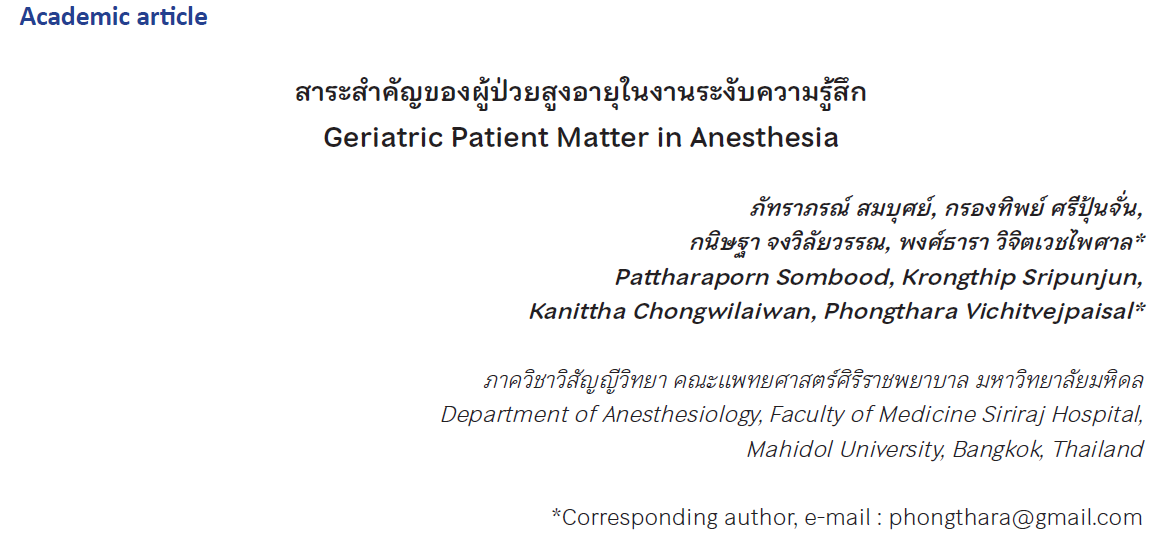Geriatric Patient Matter in Anesthesia
Keywords:
Elderly, Anesthesia, AnestheticsAbstract
The world population aged sixty-five and above is rising, largely with multiple accompanying ailments owing to mental and pathophysiologic deterioration of brain and nervous, respiratory, heart and circulatory, immune and hematologic, liver and renal structural functions, resulting in pathological weakness and hospital admission requirement.
Anesthesia personnel take care of patients during peri-operative drug administration, which is getting increasingly complicated since, in all likelihood, elderly patients receive simultaneous doses of medicine. At the same time, their catabolism and excretion are slowing down, thus causing an increase in plasma concentration and distribution, drug interaction, onset and duration of action as well as adverse events.
In addition, anesthesia personnel should consult specialists in other fields for proper planning, which is as crucial as preoperative visits and assessment of patients, choice of anesthetics and anesthesia techniques, careful observation of their emotional disruption and postoperative cognitive dysfunction. Achievement of these duties would allow the elderly to get back to their normal as soon as possible.
Downloads
References
นฤนาท โลมะรัตน์. การบริการยาระงับความรู้สึกสำหรับผู้สูงอายุ. ใน: อังกาบ ปราการรัตน์, วิมลลักษณ์ สนั่นศิลป์, ศิริลักษณ์ สุขสมปอง, ปฏิภาณ ตุ่มทอง. ตำราวิสัญญีวิทยา. พิมพ์ครั้งที่ 4. กรุงเทพฯ. เอ-พลัส พริ้น; 2556: 557-567.
National statistical office. Report on the 2018 survey of the older persons in Thailand. Accessed November 15, 2022. http://service.nso.go.th/nso/nsopublish /service/ survey/rep_older50.pdf.
Artsanthia J, Pomthong R. The trend of elderly care in 21st century: challenging in nursing care. JRTAN. 2018; 19(1): 39-46.
Morgan GE Jr, Mikhail MS, Murray MJ. Geriatric anesthesia. In: Morgan GE, Mikhail MS, Murray MJ, editors. Clinical anesthesiology. 3rd ed. New York: McGraw-Hil; 2002: 875-881.
Muravchick S. Anesthesia for the geriatric patient. In: Barash PG, Cullen BF, Stoelting RK, editors. Clin Anesthesiol. 4th ed. Philadelphia: LippincottWilliams & Wilkins; 2001: 1205-1216.
Samarendra P, Mangione MP. Aortic stenosis and perioperative risk with noncardiac surgery. J Am Coll Cardiol. 2015;65(3):295-302. doi:10.1016/j.jacc.2014.10.051.
Smetana GW, Lawrence VA, Cornell JE; American College of Physicians. Preoperative pulmonary risk stratification for noncardiothoracic surgery: systematic review for the American College of Physicians. Ann Intern Med. 2006;144(8):581-595. doi:10.7326/0003-4819-144-8-200604180-00009.
Curtis AB, Karki R, Hattoum A, Sharma UC. Arrhythmias in Patients ≥80 Years of Age: Pathophysiology, Management, and Outcomes. J Am Coll Cardiol. 2018;71(18):2041-2057. doi:10.1016/j.jacc.2018.03.019.
พงษ์ธารา วิจิตรเวชไพศาล. Update in Geriatric Monitoring ใน: ธีระพงษ์ ตัณฑวิเชียร ชุษณา สวนกระต่าย ศิริวรรณ จิรสิริธรรม และคณะ บรรณาธิการ. หนังสือประกอบการประชุมวิชาการ เวชศาสตร์ร่วมสมัย : 84 พรรษาองค์ราชัน สามสถาบันเทิดไท้ วิชาการแพทย์ก้าวไกล สุขภาพประชาไทยยั่งยืน; 15-18 มิถุนาย 2554; Impact เมืองทองธานี กรุงเทพมหานคร: โรงพิมพ์แห่งจุฬาลงกรณ์มหาวิทยาลัย 2554: 696-706.
Muravchick S. Anesthesia for the geriatric patient. In: Barash PG, Cullen BF, Stoelting RK, eds. Clinical Anesthesia 5th ed. Philadelphia: Lippincott, Williams & Wilkins; 2006: 1219-1228.
McLesky CH. Anesthesia for the geriatric patient. In: BarshPG, Cullen BF, Stoelting RK, eds. Clinical Anesthesia. Philadelphia: JB Lippincott, 1992: 1353-1388.
Muravchick S. Anesthesia for the elderly. In: Miller RD, ed. Anesthesia. New York: Churchill Livingstone, 1994: 2143-2156.
McConachie I. The elderly patient. In: McConachie I. ed. Anesthesia for the high risk patient. London: Greenwich Medical media; 2002: 101-115.
Morgan GE, Jr, Mikhall MS, Murray MJ. Geriatric anesthesia. In: Morgan GE, Mikhall MS, Murray MJ, editors. Clin Anesthesiol. 3rd ed. New York: McGraw-Hill; 2002: 875-881.
Aurini L, White PF. Anesthesia for the elderly outpatient. Curr Opin Anaesthesiol. 2014;27(6):563-575. doi:10.1097/ACO.0000000000000135.
Ludbrook G, Lloyd C, Story D, et al. The effect of advanced recovery room care on postoperative outcomes in moderate-risk surgical patients: a multicentre feasibility study. Anaesthesia. 2021;76(4):480-488. doi:10.1111/anae.15260.
Elvir-Lazo OL, White PF. The role of multimodal analgesia in pain management after ambulatory surgery. Curr Opin Anaesthesiol. 2010;23(6):697-703. doi:10.1097/ACO.0b013 e32833fad0a.
García PS, Duggan EW, McCullough IL, Lee SC, Fishman D. Postanesthesia Care for the Elderly Patient. Clin Ther. 2015;37(12):2651-2665. doi:10.1016/j.clinthera.2015.10.018.
Proc JL, Jordan H, Docherty AB. Perioperative care of people with dementia. Br J Hosp Med (Lond). 2020;81(2):1-9. doi:10.12968/hmed.2019.0345.
Monk TG, Weldon BC, Garvan CW, et al. Predictors of cognitive dysfunction after major noncardiac surgery. Anesthesiology. 2008;108(1):18-30. doi:10.1097/01.anes.0000296071.19434.1e.
Schuckit MA, Miller PL, Berman J. The three year course of psychiatric problems in a geriatric population. J Clin Psychiatry. 1980;41(1):27-32.
Rudolph JL, Inouye SK, Jones RN, et al. Delirium: an independent predictor of functional decline after cardiac surgery. J Am Geriatr Soc. 2010;58(4):643-649. doi:10.1111/j.1532-5415.2010.02762.x.
Rudolph JL, Marcantonio ER, Culley DJ, et al. Delirium is associated with early postoperative cognitive dysfunction. Anaesthesia. 2008;63(9):941-947. doi:10.1111/j.1365-2044.2008.05523.x.
Wacker P, Nunes PV, Cabrita H, Forlenza OV. Post-operative delirium is associated with poor cognitive outcome and dementia. Dement Geriatr Cogn Disord. 2006;21(4):221-227. doi:10.1159/000091022.
Chen PL, Yang CW, Tseng YK, et al. Risk of dementia after anaesthesia and surgery. Br J Psychiatry. 2014;204(3):188-193. doi:10.1192/bjp.bp.112.119610.
Ghoneim MM, Block RI. Clinical, methodological and theoretical issues in the assessment of cognition after anaesthesia and surgery: a review. Eur J Anaesthesiol. 2012;29(9):409-422. doi:10.1097/EJA.0b013e328356bd6e.
Tasbihgou SR, Absalom AR. Postoperative neurocognitive disorders. Korean J Anesthesiol. 2021;74(1):15-22. doi:10.4097/kja.20294.
Marcantonio ER, Flacker JM, Michaels M, Resnick NM. Delirium is independently associated with poor functional recovery after hip fracture. J Am Geriatr Soc. 2000;48(6):618-624. doi:10.1111/j.1532-5415.2000.tb04718.x.
Rudolph JL, Schreiber KA, Culley DJ, et al. Measurement of post-operative cognitive dysfunction after cardiac surgery: a systematic review. Acta Anaesthesiol Scand. 2010;54(6):663-677. doi:10.1111/j.1399-6576.2010.02236.x.

Downloads
Published
How to Cite
Issue
Section
License
Copyright (c) 2024 Chulabhorn Royal Academy

This work is licensed under a Creative Commons Attribution-NonCommercial-NoDerivatives 4.0 International License.
Copyright and Disclaimer
Articles published in this journal are the copyright of Chulabhorn Royal Academy.
The opinions expressed in each article are those of the individual authors and do not necessarily reflect the views of Chulabhorn Royal Academy or any other faculty members of the Academy. The authors are fully responsible for all content in their respective articles. In the event of any errors or inaccuracies, the responsibility lies solely with the individual authors.


